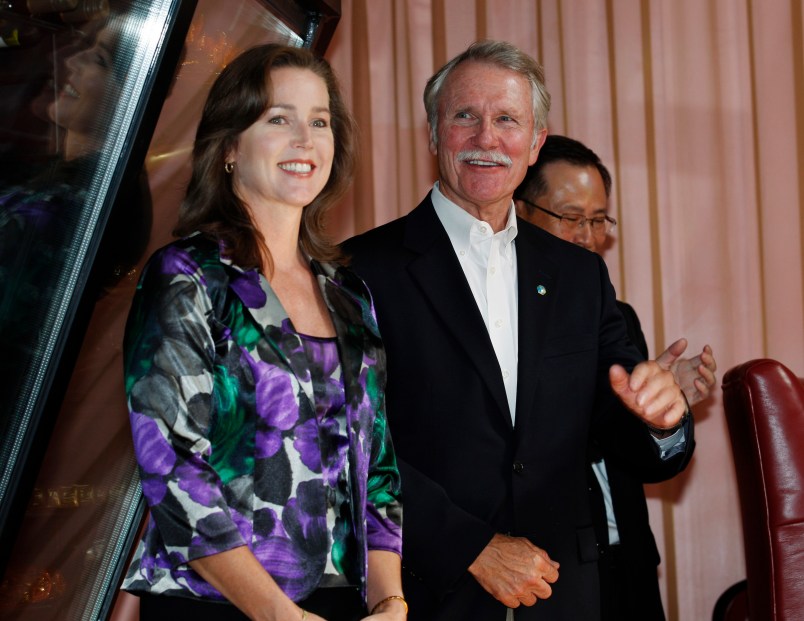According to some reports Thursday morning, the Oregon’s governor race was suddenly up for grabs. A new poll, as it was reported anyway, showed voters making a huge swing from the incumbent Democrat to his Republican opponent as scandals engulfed the governor’s fiancee. But there was a big problem: The poll didn’t ask a straight-up head-to-head question. But it was treated as such, anyway, sparking a momentary freakout among political watchers.
“A dramatic shift in poll numbers has taken place since Governor John Kitzhaber’s campaign became riddled with scandal,” declared Portland radio station KXL. “A poll commissioned by KATU has Dennis Richardson with a surprising double-digit lead,”
The radio station’s report was tweeted out by Political Wire:
Wow, the scandal involving Oregon’s first lady has shaken up the OR-Gov race. Kitzhaber now trailing badly.
http://t.co/KpaqpXt0dV
— Taegan Goddard (@politicalwire) October 23, 2014
But this wasn’t a straight-up horse race poll. It was delving into a subset of the respondents to find out how much of an impact the recent scandal was having.
Democratic Gov. John Kitzhaber’s fiancee, Cylvia Hayes, has been the center of controversy in recent weeks, with revelations that she had married an Ethiopian migrant in the 1990s for money and worked at a pot farm around the same time.
So the new Survey USA poll asked about it and the results didn’t look good for Kitzhaber, who has held a consistent and sizable lead over GOP challenger Dennis Richardson. But the pollster had not asked a traditional “Would you vote for…” question.
But that didn’t stop some of the coverage from comparing this poll to other recent horse race polls.
The poll started by asking voters whether they were following the governor’s race and then whether they were following the Hayes scandal. That narrowed the field from 950 contacts to 407 voters. Then it asked them whether the news would change their vote in favor of or against the governor.
That’s where the situation turned worrisome for Kitzhaber. Just 38 percent of those surveyed said they would still vote for Kitzhaber (and another 1 percent said they were switching from Richardson to Kitzhaber). But 18 percent said they would switch from Kitzhaber to Richardson.
Those 18 percent, paired with the 37 percent who said they would continue backing Richardson, would give the challenger a 55 percent to 39 percent lead over the incumbent — at least among this population.
But that’s the limit of the poll. Not only was the wording unusual, at least compared to the typical “Would you vote for…” query, but it was a much smaller sample size. And the poll’s authors acknowledged that.
“The poll’s essential question was asked just of the 407 qualified respondents,” they wrote. “This may or may not directly overlap the universe of Oregon’s likely voters in 2014.”
But that didn’t stop KXL — and some of the national political observers who picked up the poll before delving into its methodology — from portraying the survey as a possible game-changer.
But a review of the poll itself lead to a quick reevaluation of its merits.
In retrospect, this is a pretty dumb way to conduct a poll
http://t.co/KpaqpXt0dV
— Taegan Goddard (@politicalwire) October 23, 2014







Isn’t Oregon a vote-by-mail state, and aren’t most of the ballots already out and probably already mailed back?
No way Richardson beats Kitzhaber. He is a far right ideologue, apparently a personable man, and able to work in the legislature, but that fact that Kitzhaber has abysmal taste in women is not enough to disqualify him. Oregon pays for Medicaid abortions and is the only state NOT to put restrictions on a woman’s right to choose; we do not elect an anti-abortion, anti-gay Mormon who lives in a gated community in Bend.
By the way, just to let TPM know my polling firm conducted a poll recently on the chances of the senate becoming republican majority. Much to our surprise we found that almost 90% of the people in the country want to replace every single democrat in the senate with a republican. That’s a total game changer and bodes ill for the 2016 presidential election. Cross tabs can be provided on request.
Yes, Oregon is completely vote by mail but the ballots were only sent out a week ago. I’ve yet to read my voters booklet just like many others.
Kitz has not had his eye on the ball these past four years that much is certain. And his fiance apparently is a self serving woman who has used his office to garner business for her consulting business. If Oregonians had a choice other than Dennis Richardson then the majority would probably not do what I’m going to do this year…hold my nose and vote for Kitzhaber.
AND I’m voting for Open Primaries. If we had this in place this season the odds are that we’d have choices between Kitz and a more compelling Democrat this season. The same holds true for Senator Merkely.
Oregon is so deeply blue that the Democrats get elected knowing that they can be mediocre while in office and still be voted back in.
Open Primaries where the top two, regardless of party affiliation, proceed to the general election can be the remedy for that.
The problem with Kitzhaber I can understand (especially after the failure of the state’s health exchange). But what’s your beef with Merkley?